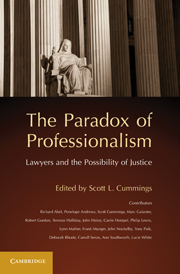Book contents
- Frontmatter
- Contents
- List of Tables and Figures
- Contributors
- Preface and Acknowledgments
- 1 Introduction
- PART I LAWYERS AND THE PUBLIC GOOD: THE FUNDAMENTAL DILEMMA
- PART II LAWYERS AND THEIR CLIENTS: DETERMINANTS OF ETHICAL PRACTICE
- PART III LAWYERS AND SOCIAL CHANGE: MOBILIZING LAW FOR JUSTICE
- 10 Without Fear, Favor, or Prejudice
- 11 Lawyers in National Policymaking
- 12 Cause Lawyers and Other Signs of Progress
- 13 African Youth Mobilize against Garbage
- 14 Epilogue
- Index
- References
13 - African Youth Mobilize against Garbage
Economic and Social Rights Advocacy and the Practice of Democracy
Published online by Cambridge University Press: 05 June 2012
- Frontmatter
- Contents
- List of Tables and Figures
- Contributors
- Preface and Acknowledgments
- 1 Introduction
- PART I LAWYERS AND THE PUBLIC GOOD: THE FUNDAMENTAL DILEMMA
- PART II LAWYERS AND THEIR CLIENTS: DETERMINANTS OF ETHICAL PRACTICE
- PART III LAWYERS AND SOCIAL CHANGE: MOBILIZING LAW FOR JUSTICE
- 10 Without Fear, Favor, or Prejudice
- 11 Lawyers in National Policymaking
- 12 Cause Lawyers and Other Signs of Progress
- 13 African Youth Mobilize against Garbage
- 14 Epilogue
- Index
- References
Summary
INTRODUCTION
In this chapter, I examine lawyers and activists using human rights to engage people in a grassroots advocacy campaign for healthy living conditions. More specifically, I map how a group of young men, organized into a Federation of Youth Clubs, worked with a nongovernmental human rights organization to challenge inadequate waste disposal in their community, a sprawling urban “slum” in the West African city of Accra, Ghana.
The chapter has four parts. In the first part, I describe their community, which is called Nima, and then sketch the tactics the youth, along with the lawyers and organizers who supported them, used in their human rights campaign.
In the second part, I examine three different framings of the issue, all of which might be consistent with an overarching human rights advocacy campaign. How did the youth and other community members understand why waste was piling up in their community and what they could do about it? What explanatory frames were the lawyers and activists pushing on them?
My own work in the community suggests that three different implicit theories – three different “namings” – were at play simultaneously. In spite of what distant analysts might believe, from a ground-level perspective no single theory seemed to drown out the others, even as wide swaths of the community used “human rights tactics” to challenge the problem. The result of these multiple framings created a messy – and “living” – campaign, for each theory pointed toward different objectives, analyses, targets, and tactics.
- Type
- Chapter
- Information
- The Paradox of ProfessionalismLawyers and the Possibility of Justice, pp. 274 - 295Publisher: Cambridge University PressPrint publication year: 2011



